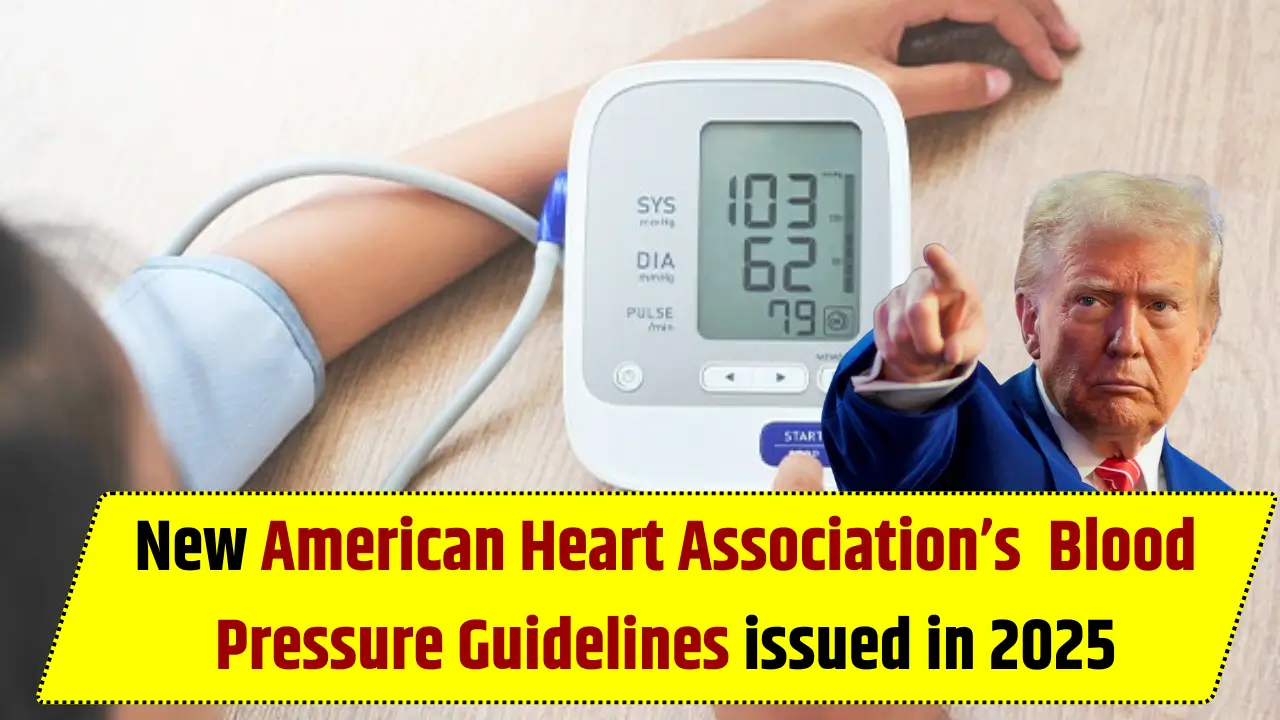Local cardiologist explains American Heart Association’s new high blood pressure guidelines issued in 2025, shedding light on critical updates that affect millions of Americans.
Hypertension, commonly known as high blood pressure, is a leading cause of heart disease and stroke, health conditions that significantly burden public health in the US.
The American Heart Association (AHA), along with the American College of Cardiology (ACC) and other societies, updated their clinical guidelines to reflect new scientific evidence and improve prevention, detection, and management of high blood pressure.
This article shares expert insights on the 2025 guidelines, what has changed, how patients and clinicians can apply these recommendations, and why timely blood pressure control is more important than ever.
Why Update the High Blood Pressure Guidelines?
According to the cardiologist, advances in medical research over recent years prompted a comprehensive review of hypertension management.
The 2017 guidelines established important parameters, but accumulating data on cardiovascular risks, dementia prevention, and personalized medicine required a new approach.
Dr. Daniel W. Jones, MD, chair of the guideline writing committee, explains: “Despite progress, hypertension remains the most prevalent and modifiable risk factor for heart disease. Our updated guidelines provide a living, flexible document, integrating the latest evidence to better identify and treat at-risk patients.”
The new guidelines incorporate improved cardiovascular risk assessment tools such as the PREVENT risk calculator, which captures kidney and metabolic health alongside traditional factors, leading to more nuanced treatment decisions.
Key Changes in the 2025 Guidelines
The major changes emphasized by the cardiologist include:
- Lower Blood Pressure Targets: The goal is now achieving a systolic blood pressure below 130 mmHg, and ideally closer to 120 mmHg, to minimise risk.
- Earlier Treatment Initiation: Patients with consistent readings of 130/80 mmHg or more and a 10-year cardiovascular risk over 7.5% may begin medication earlier, without waiting for severely high readings.
- Lifestyle Modifications as First Step: Emphasis remains on diet (such as the DASH eating plan), sodium reduction (targeting ideally below 1,500 mg daily), exercise, weight management, and stress control.
- Screening for Secondary Causes: A strong recommendation to evaluate for primary aldosteronism in those with resistant hypertension, irrespective of potassium levels.
- Continued Medication Before Testing: Advises continuing most antihypertensive medications during diagnostic workup to avoid delays in treatment.
- Tailored Medication Regimens: Utilization of combination pills and consideration of new therapies, including GLP-1 receptor agonists for hypertensive patients with obesity.
- Pregnancy Management: Recommendations to start treatment for chronic hypertension in pregnant women when BP reaches 140/90 mmHg to reduce serious complications.
- Expanded Lab Testing: Routine use of urine albumin to creatinine ratio in all hypertensive patients, previously optional.
- Focus on Cognitive Health: Hypertension control is linked to reduced risk of cognitive decline and dementia, highlighting a broader protective role.
Practical Implications for Patients and Clinicians
As explained by the cardiologist, these changes aim to improve early identification and management of hypertension, thus reducing heart attacks, strokes, and kidney disease while enhancing patient quality of life.
- Regular Monitoring: Annual blood pressure checks for all adults, more frequent for those with elevated or high BP.
- Home and Ambulatory Monitoring: Increased reliance on 24-hour monitoring devices to identify white coat hypertension and assess true treatment needs.
- Shared Decision-Making: Physicians should involve patients in decisions about when to start medications, aligning risks and preferences.
- Lifestyle Support: Reinforces the critical and ongoing role of dietary and behavioural changes as the foundation of therapy.
- Medication Initiation: More patients will start drug therapy earlier, often with dual or combination therapy for better control.
Table: 2025 AHA/ACC Blood Pressure Classification and Treatment Recommendations
| BP Category | Systolic (mmHg) | Diastolic (mmHg) | Treatment Approach |
| Normal | <120 | <80 | Maintain healthy lifestyle |
| Elevated | 120–129 | <80 | Lifestyle changes |
| Hypertension Stage 1 | 130–139 | 80–89 | Lifestyle changes; medication if risk >7.5% |
| Hypertension Stage 2 | ≥140 | ≥90 | Lifestyle changes and medication |
| Hypertensive Crisis (consult immediate care) | >180 | >120 | Emergency medical intervention |
Lifestyle Measures Recommended by the AHA
- Diet: Follow the DASH diet emphasising vegetables, fruits, whole grains, lean protein, and low sodium.
- Sodium Intake: Limit to under 2,300 mg daily, ideally below 1,500 mg.
- Physical Activity: Aim for at least 150 minutes of moderate aerobic exercise weekly.
- Alcohol: Reduce or eliminate intake to less than 1 drink/day women, 2 drinks/day men.
- Weight Management: Losing a minimum of 5% body weight can significantly reduce BP.
- Stress Reduction: Techniques such as meditation and yoga supported.
Conclusion
The American Heart Association’s new high blood pressure guidelines issued in 2025 represent a vital step forward in the prevention and management of hypertension.
As explained by our local cardiologist, earlier intervention, more personalised treatment approaches, and a continued emphasis on lifestyle changes will help millions reduce their risk of cardiovascular disease, kidney complications, and cognitive decline.
Awareness and implementation of these guidelines by patients and healthcare providers are essential to improving population health outcomes and reducing the burden of hypertension-related diseases in the years ahead.
FAQs
1. What is the new blood pressure target according to the 2025 AHA guidelines?
The target systolic BP is below 130 mmHg, ideally near 120 mmHg.
2. When should medication be started for elevated blood pressure?
Medication is recommended at 130/80 mmHg or higher if the 10-year cardiovascular risk exceeds 7.5%.
3. Are lifestyle changes still important if medication is needed?
Yes, lifestyle changes such as diet, exercise, and sodium reduction remain foundational.
4. What role does blood pressure control play in cognitive health?
Tighter BP control reduces the risk of cognitive decline and dementia over time.
5. How often should adults have their blood pressure checked?
At least once a year, more often if BP is elevated or treatment is ongoing.















